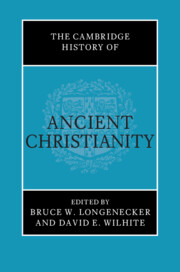Book contents
- The Cambridge History of Ancient Christianity
- The Cambridge History of Ancient Christianity
- Copyright page
- Contents
- Figures
- List of Contributors
- Editors’ Preface
- Part I Contested Contexts
- Part II Contested Figures
- Part III Contested Heritage
- Part IV Contested Cultures
- 14 Early Christians and Their Socioeconomic Contexts
- 15 Early Christians and Roman Imperial Ideology
- 16 Martyrdom between Fiction and Memory
- 17 The Emergence(s) of Christian Material Culture(s)
- 18 Manuscripts and the Making of the New Testament
- Part V Contested Beliefs
- Part VI Contested Bodies
- Ancient Sources
- Modern Authors
- References
14 - Early Christians and Their Socioeconomic Contexts
from Part IV - Contested Cultures
Published online by Cambridge University Press: 23 August 2023
- The Cambridge History of Ancient Christianity
- The Cambridge History of Ancient Christianity
- Copyright page
- Contents
- Figures
- List of Contributors
- Editors’ Preface
- Part I Contested Contexts
- Part II Contested Figures
- Part III Contested Heritage
- Part IV Contested Cultures
- 14 Early Christians and Their Socioeconomic Contexts
- 15 Early Christians and Roman Imperial Ideology
- 16 Martyrdom between Fiction and Memory
- 17 The Emergence(s) of Christian Material Culture(s)
- 18 Manuscripts and the Making of the New Testament
- Part V Contested Beliefs
- Part VI Contested Bodies
- Ancient Sources
- Modern Authors
- References
Summary
This essay will assess scholarship from the last two decades on the socioeconomic profile and diversity of the early Christian communities. Several methodological observations about recent studies on social stratification and its implications for early Christian groups in the Greco-Roman world will also be offered, touching on poverty and the dynamics of rank and status in antiquity.1 The transitions in scholarly consensus prior to twenty-first-century scholarship on social stratification in the early Christian communities are well known and need only be briefly summarized below.
- Type
- Chapter
- Information
- The Cambridge History of Ancient Christianity , pp. 325 - 346Publisher: Cambridge University PressPrint publication year: 2023



